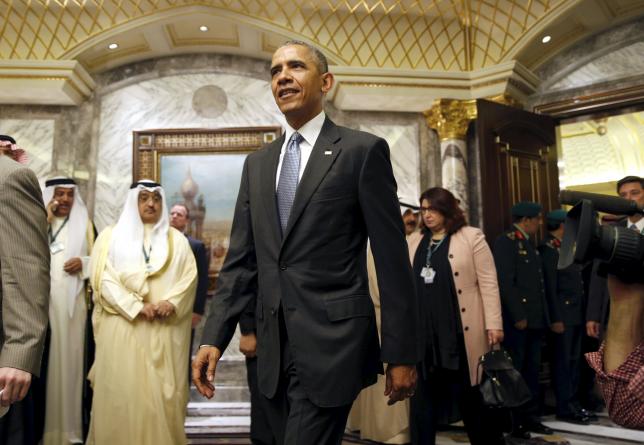RIYADH, April 21:The United States will deter and confront aggression against Gulf Arab monarchies, who continue to have concerns about threats from Iran, President Barack Obama said after meeting their leaders to iron out strains in their alliance.
Obama came to Saudi Arabia hoping to allay Gulf states’ fears over Iranian influence and encourage them to douse sectarian tensions in an effort to confront the threat posed by jihadist militants like Islamic State.
“I reaffirmed the policy of the United States to use all elements of our power to secure our core interests in the Gulf region and to deter and confront external aggression against our allies and our partners,” he said in Riyadh on Thursday after the summit with the Gulf Cooperation Council (GCC).
The president added in his statement that all the leaders were committed both to the fight against Islamic State and to de-escalating regional conflicts, and addressed the Gulf countries’ concerns on Iran.
“Even with the nuclear deal we recognize collectively that we continue to have serious concerns about Iranian behavior,” he said.
There was no denying the strains that have afflicted ties between Washington and its Gulf partners, though, even as they have worked together on shared concerns such as the wars in Syria, Iraq and Yemen, however.
“What is true between the United States and the GCC, as is true with all of our allies and friends is that at any point of time there are going to be differences,” Obama said.
Footage and photographs aired on state media showed the leaders at a large circular table under a chandelier, with Obama sitting with King Salman on his left and the Abu Dhabi crown prince Sheikh Mohammed bin Zayed al-Nahayan on his right.
Years of frustration among Gulf countries, aggravated by more recent stumbles, may have made Saudi Arabia and its regional allies less receptive to Obama on his fourth and most probably final trip to the kingdom.
The Middle East is mired in a contest for influence between a bloc of mostly Sunni countries, including the conservative, pro-Western Gulf monarchies, and revolutionary Shi’ite Iran and its allies.
Most of the GCC states have been bitterly disappointed in Obama’s presidency, during which they believe the United States has pulled back from the region, giving more space to Iran.
They were also upset by Obama’s remarks in a magazine interview that appeared to cast them as “free-riders” in U.S. security efforts and urged them to “share” the region with Tehran.
“On the core issues, there’s agreement about where we want to go,” Ben Rhodes, Obama’s deputy national security adviser, told reporters at a briefing in Riyadh.
He said strains in ties in recent years reflected differences over tactics rather than goals. “This summit allows us to align our approaches and strategies,” he said.
Rhodes said a two-hour meeting with Saudi Arabia’s King Salman on Wednesday was the longest the two leaders had shared and included a “very open and honest discussion” that included issues which were a source of tension, without specifying them.
“I think they both agreed that it was good to essentially have this opportunity to clear the air,” he said.
The American president has said he wants Gulf allies to offer more democratic reforms and improve human rights, and he discussed that with King Salman on Wednesday. Adding to tensions is a bill proposed in U.S. Congress to lift Riyadh’s immunity if any Saudi officials are found to have been involved in the Sept. 11, 2001, attacks. Obama has said he opposes the bill because it could lead to cases directed against the United States in foreign courts.-Reuters



